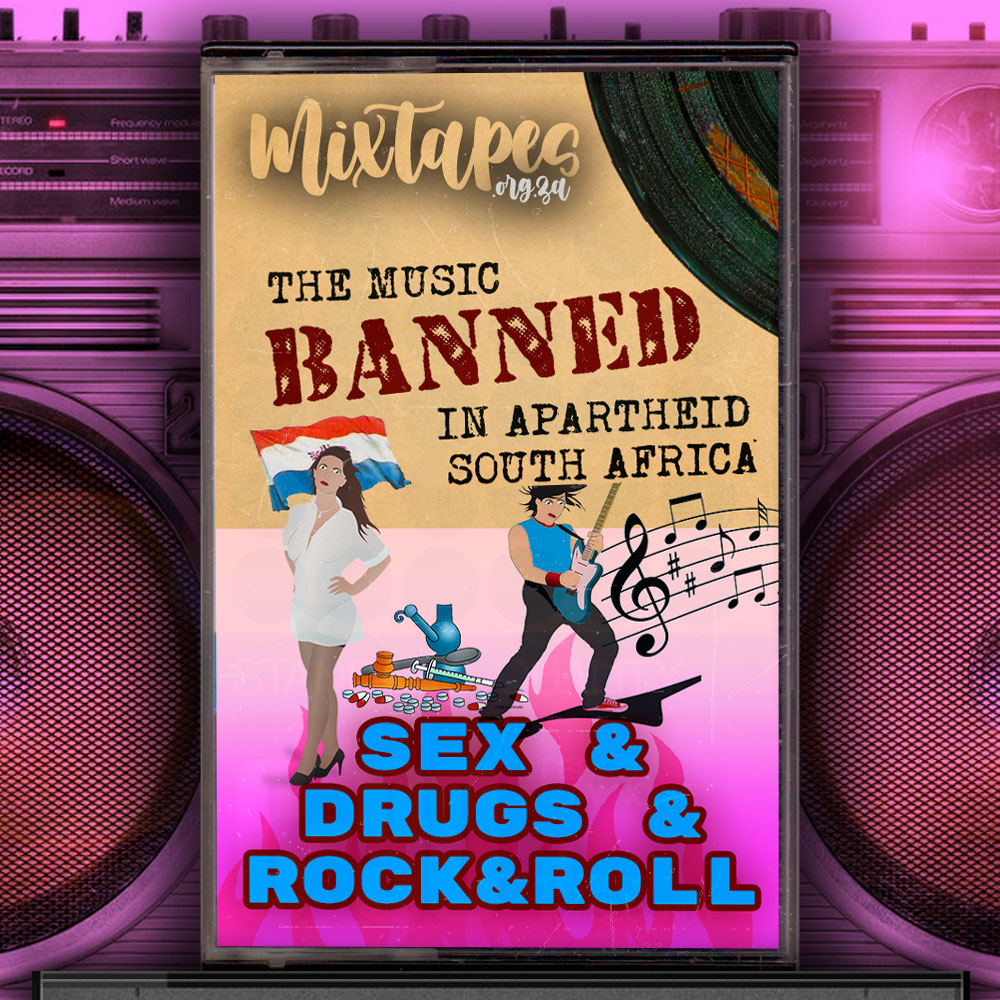
In 1963 the South African apartheid government passed the Publications and Entertainments Act of 1963 which led to the establishment of South Africa’s first central government censorship board. Although its name and various regulations changed over the years, the censorship board went on to ban well over one hundred music albums and singles over the next three decades. One of the categories of censorship was obscenity, which included sex, drugs and bad language.
This mixtape focuses on examples of songs banned for the first two of these criteria: they promoted sex or they promoted drug use.
Several vaudeville-type songs were banned in the 1960s and early 1970s because they promoted sex. These included entire albums by Oscar Brand (Bawdy Western Songs), the Jock Strappe Ensemble (Why Was He Born So Beautiful And Other Traditional Rugby Songs), Glenda Kemp (Both Sides of Glenda Kemp) and Ivor Biggun (More Filth! Dirt Cheap …). For this mixtape Oscar Brand’s “Charlotte the Harlot”, The Jock Strappe Ensemble’s “The Mayor of Bayswater”, Ivor Biggun’s “Wanking Your Blues Away” (printed on record sleeves as “Winking Your Blues Away”) and Glenda Kemp’s “Strike Buster” have been chosen as good examples of the sorts of things which got the censors hot under the collar.
Other albums from the same era which were banned included Chuck Berry’s London Sessions, the original cast recordings of the musicals, Let My People Come and Hair from which “My Ding A Ling”, “Choir Practice” and “Sodomy” have been selected respectively.
During the late 1960s and into the 1970s a trend set in whereby recorded popular featured the sound of orgasm(s), mostly to titillate the listener but sometimes to provide additional sensual vocals to otherwise potentially monotonous long disco tracks. The apartheid censors regularly censored such music, including the following songs included on this mixtape: “Love To Love You Baby” by Donna Summer, “Slow Blow” by Hot R.S., “Je T’aime .. .. .. Moi Non Plus” by Serge Gainsbourg and Jane Birkin, “Airport Love Theme” by Super Erotica and “Cruisin’ The Streets” by Boys Town Gang. Whereas it was typical for women to be making the sensual sounds in such songs, “Slow Blow” and “Cruisin’ The Streets” feature males making orgasmic sounds; the latter song was even more controversial for apartheid-era censors because the men in question were pleasuring each other.
Some songs were banned because they were deemed to promote sex in a particularly (for the censors) lewd fashion, such as Blowfly’s “The Girl Wants To Fuck”, Celi Bee and the Buzzy Bunch’s “Superman”, Frank Zappa and the Mothers’ “Dinah-Moe-Hum”, George Michael’s “I Want Your Sex” and “Hlope Jive” by the Naledi Boys. The last of these was banned because of a spoken dialogue at the outset, supposedly between a brother and sister who discuss an unpleasant oral sexual exchange they have shared.
The censors also thought that Des & Dawn’s spoken word humorous piece about “The Pill” was too immoral for 1960s South Africa. And Blue Mink’s “Melting Pot” was far too scandalous in apartheid South Africa, suggesting that people of different races get together to produce “coffee-coloured people by the score”. On a bizarre note, Patti Smith’s “Pissing In A River” off the Times Square film soundtrack was banned for promoting sex because the censor transcribed “Come for me” as “Come fuck me”.
Several albums were banned because they featured images of marijuana on the front cover, including Culture’s International Herb and U-Roy’s Dread In Babylon. Songs which were banned for the same reason included “Legalize It” by Peter Tosh (including the album because of the cover) and “Show Me The Way To Get Stoned” by David Peel & the Lower East Side, whose entire Have A Marijuana album was banned.

